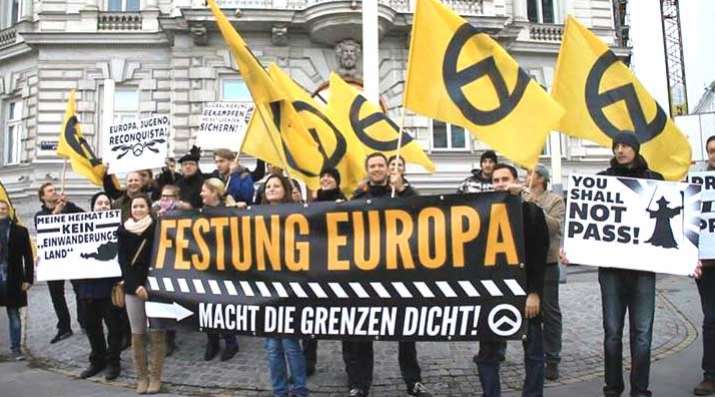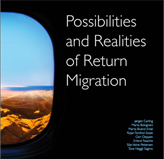
Reaching out to close the border: The Transnationalization of Anti-Immigration Movements in Europe (MAM)
It is a paradox that anti-immigration movements, whose key concern is opposing mobility across borders and who advocate isolationism, nationalism and cultural traditionalism, often work transnationally, with joint events, strategies and campaigns across borders and in multilateral forums. The Mobilisation against Migration (MAM) project explores this transnational dimension of European anti-immigration movements more closely, by focusing on (1) interaction, (2) framing and (3) outcomes on migration policies. The project involves five case studies (Germany, Italy, Norway, Poland, UK). The British case study based at the University of Sussex and involves Dr Aleksandra Lewicki (PI) and Maddison Clark (RA).
See also:
‘Building a New Nation: Anti-Muslim Racism in Post-Unification Germany’
Journal of Contemporary European Studies, 28 (1) 30 – 43, 2020 (with Yasemin Shooman)
‘Shrinking Spaces für die Zivilgesellschaft. Aktivismus unter illiberalen Vorzeichen‘
Forschungsjournal Soziale Bewegungen, 33 (3). 2020 (with Piotr Kocyba)

Discrimination and Racism in Health and Social Care
„Umgang mit kultureller, sozio-ökonomischer und religiöser Diversität“ (Cultural, Socio-Economic and Religious Diversity in Public Life) Expertise commissioned by the Mercator Foundation (in collaboration with the Federal Antidiscrimination Agency and ProDiversity)
„Diskriminierungsrisiken und Diskriminierungsschutz im Gesundheitswesen“ (Risks of and Protection from Discrimination in Health Care) Expertise für die Antidiskriminierungsstelle des Bundes (in collaboration with the Deutsches Zentrum für Migrations- und Integrationsforschung, DeZIM).
The COVID-19 crisis has exacerbated structural inequalities, which became also more notable in the provision of health care. While a well-resourced health care system could partially mitigate some of these inequities, there is considerable evidence that ethnic and religious minorities experience direct and indirect discrimination in health and social care institutions. Research into institutional discrimination is scarce in Germany, yet some quantitative and qualitative studies offer evidence of unequal outcomes in this sector. The literature indicates asymmetries in access to care and emergency services, discrimination in everyday encounters and communication in the welfare sector, and within institutional routines and procedures.
Current attempts to address unequal outcomes are reactive rather than preventive and tend to focus more on processes of ‘intercultural opening’ than on protection from discrimination. There are singular best practice examples scattered across the country, where individual hospitals work with professional translators, local authorities have offered funding for further training to staff in care for older people, or residential facilities evaluate their organisational statistics for equality monitoring purposes.
See also:
The material effects of Whiteness: Institutional Racism in the German Welfare State, The Sociological Review.
The Christian Politics of Identity and the Making of Race in the German Welfare State, Sociology.
Diskriminierungsrisiken und Diskriminierungsschutz im Gesundheitswesen – Wissensstand und Forschungsbedarf für die Antidiskriminierungsforschung, Antidiskriminierungsstelle des Bundes
Diskriminierungsrisiken und Handlungspotentiale im Umgang mit kultureller, sozio-ökonomischer und religiöser Diversität, Stiftung Mercator
Sind Menschen mit Migrationshintergrund stärker von Covid-19 betroffen? Expertise für den Mediendienst Integration
Corona trifft Minderheiten besonders hart, Interview mit dem Mediendienst Integration
Gibt es Rassismus in deutschen Arztpraxen? Artikel von Lina Verschwele, Süddeutsche Zeitung
Was ist struktureller Rassismus? zusammengestellt von Donata Hasselmann, Mediendienst Integration

Care Ethics and the Production of Racial and Moral Others in Institutional Life
www.bgsmcs.fu-berlin.de/en/people/
This project explored mechanisms of institutional discrimination in the German welfare state. Specifically, I focused on the two largest welfare providers, the Christian Caritas and Diakonie, and their residential care facilities for older people. While both associations have regularly defended their right to preferentially hire members of their own faith, especially for leadership positions, they consider themselves ‘equally open’ to everyone in their provision of services. This constellation inspired my research: specifically, I was intrigued by how welfare institutions ‘on the ground’ translated principles of equality, together with the prescribed exemptions, into everyday routines in care facilities. What institutional culture resulted from a principled commitment to equality, and the simultaneous need to consider exemptions in everyday decisions, habits and routines?
See also:
‚Gleichbehandlung in der Pflege? Institutionelle Diskriminierung und Reformbedarf’
in Dibelius, Olivia and Piechotta-Henze, Gudrun, eds. (2020), Menschenrechtsbasierte Pflege: Plädoyer für die Achtung und Anwendung von Menschenrechten in der Pflege, 215-226, Hogrefe Verlag
‘Christliche Wohlfahrtsverbände: Vielfalt und Diskriminierung in der Seniorenpflege’
Expertise 2017 Mediendienst Integration

Enhancing spaces of participation
Together with Therese O’Toole, I worked on a co-produced research project on Muslim women’s glocalized struggles around their exclusion from gendered spaces of decision-making. The study emerged from a dialogue with Bristol City Council and a range of ethnic minority organisations in Bristol.
See also:
‘Acts and Practices of Citizenship: Muslim Women’s Activism in the UK’
Ethnic and Racial Studies, 40 (1): 152 – 171, 2017 (with Therese O’Toole)
‘Enhancing Spaces for Muslim Women’s Engagement’
Bristol: Policy Bristol, University of Bristol. 2015 (with Nura Aabe, Therese O’Toole et al.) www.bris.ac.uk/media-library
‘Building the Bridge: Muslim Community Engagement in Bristol’
Research Report, Bristol: University of Bristol. 2014 (with Therese O’Toole und Tariq Modood)
www.publicspirit.org.uk

Possibilities and Realities of Return Migration (PREMIG)
Return migration has many faces: for some migrants it is a dream that they hope to realize. Others live in fear of being returned against their will. PREMIG took a broad approach to cover the diverse aspects of return migration. Within this large-scale project, I collected and conducted data analysis for the British case study of Polish EU migrants. Marta Bivand Erdal and I wrote a comparative piece on Polish migrants practices of citizenship in Britain and Norway, and edited a Special Issue of Social Identities together.
See also:
‘Polish Migration to Europe: Mobility, Transnationalism and Settlement’
Special Issue Social Identities, 22 (1). 2016 (with Marta Bivand Erdal)
‘Moving Citizens: Citizenship Practices among Polish Migrants in the UK and Norway’
Social Identities, 22 (1): 112 – 128, DOI: 10.1080/13504630.2015.1110371. 2016 (with Marta Bivand Erdal)

Social Justice through Citizenship?
The Politics of Muslim Integration in Germany and Great Britain
dbms.ilrt.bris.ac.uk/spais/people
My doctoral work looked comparatively at equality policy frameworks and consultation mechanisms with Muslim community representatives in Germany and the UK. It showed how structural inequalities and asymmetries are inscribed into the contemporary notions of citizenship that underpin European integration policy frameworks. I discuss these issues in my book with Palgrave Macmillan, as well as in several academic journal articles and public talks and briefings.
See also:
‚Race, Religion and Social Justice’
in Craig Gary Hrsg. (2018), Global Handbook of Social Justice, Cheltenham: Edward Elgar
‘Social Justice through Citizenship? The Politics of Muslim Integration in Germany and Great Britain’,
(2012) Monograph with Palgrave Macmillan
‘The blind spots of liberal citizenship and integration policy’
Patterns of Prejudice, 51 (5) 2017
